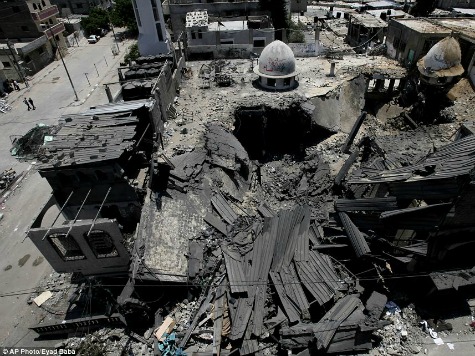
While salvaging Qurans from the rubble of the Al-Farouq Mosque in Gaza, junior imam Muhammad Hamad told the New York Times, “This is a house of God” – as though this proved the mosque is a peaceful place of worship. He said this after Al-Farouq had been targeted by the Israel Defense Forces (IDF) on July 12.
According to IDF spokesperson Lt. Col. Peter Lerner, intelligence indicated the mosque was used as “a Hamas rocket cache and gathering point for militants.” According to Hamad, “That charge is baseless.”
This debate conjures striking visuals – the military against the mosque, the Qurans amidst the rubble, and the young imam invoking the term “house of God.” Media outlets eagerly perpetuate this narrative however incomplete or inaccurate. The problem, however, starts at the very root of the story, with the mosque. Let’s explore what a “house of God” might look like to an average person living in a Palestinian-controlled neighborhood.

Caliph Abu Bakr Mosque in Aida. Photo credit: Danielle Avel
The above picture shows the Caliph Abu Bakr Mosque in Aida in “Area A” on the West Bank. Area A means Israel maintains control over external security, so Palestinians there are limited in the weapons they can amass, unlike in Hamas-controlled Gaza where Israel relinquished control of the border. Though Israel prevents missiles from entering the West Bank, Area A is otherwise similar to Gaza in that Palestinians are responsible for their own neighborhoods – central to those neighborhoods are mosques.
The Aida mosque entryway is festooned with violent messaging that celebrates terrorists, that show all of Israel gone from the map, and advertisements for conferences that promote the caliphate (i.e., radical Islam taking over the world).

Caliph Abu Bakr Mosque main entrance in Aida. Photo credit: Danielle Avel
Note at least 7 specific examples of politicized imagery in the above photo:
- Drawing of the word “Fatah,” the quasi-political party that rules the Palestinian Authority
- Stylized drawing in Arabic depicting a map of Israel as “Palestine” as the final letter
- “Fatah” graffiti
- Remnants of an advertisement for the Islamist group Hizb ut-Tahrir’s 2012 Caliphate Conference
- Poster celebrating a released terrorist with common Palestinian imagery featuring a map of Israel as “Palestine”
- Remnants of a poster celebrating another terrorist
- Poster advertising the 2013 Hizb ut-Tahrir of Palestine Caliphate Conference

Aida mosque side entrance. Photo credit: Danielle Avel
This next photo shows a child walking by the side entrance of the same mosque. Directly above his head is a poster celebrating 2 terrorists with a common slogan, “throw off your chains.” On either side of the terrorist poster are advertisements for a caliphate conference. The wall is splattered with graffiti: “Fatah” appears frequently alongside the terms “struggle” and “Phalanxes of Martyrdom,” which are calls to war.
Mosques like Aida’s are commonplace in Palestinian-controlled neighborhoods of Gaza and the West Bank: radical Islam is the norm, terrorists are celebrated, and the messaging reiterates the goal of destroying the Jewish State.
These messages, openly celebrated even on the exterior walls of “houses of God” make it is easy to comprehend how Palestinian mosques become part of their terrorist infrastructure.
Further, Palestinians have a documented history of using mosques as bases for terrorism. A few examples:
- In 2003, Israeli police thwarted a suicide attack and located the explosives belt in a mosque in Taibeh.
- In 2003, Hamas terrorists in Hebron used their mosque’s football team as cover while they carried out a series of suicide attacks that killed 34 Israelis.
- In 2003, Ra’ed Misk, an imam of a mosque in Hebron, carried out a suicide attack that killed 23 civilians. He was dressed in the explosives belt at a mosque in eastern Jerusalem.
- In 2008, the IDF bombed a mosque in Gaza City that was used to store missiles and explosives and was used as a launching ground for rocket attacks.
- In 2009, during Operation Cast Lead, IDF forces uncovered weapons caches in mosques throughout Gaza including ones in Jabaliya, Al-Atatra, and the Zeitun neighborhood of Gaza City.
As for the Al-Farouq Mosque recently targeted in Gaza for being a “rocket cache” and meeting place for terrorists, it broadcasts publicly its affiliation with Hamas and its promotion of jihad on the mosque’s Facebook page.

Screenshots from the Al-Farouq mosque Facebook page. Credit: The Meir Amit Intelligence and Terrorism Information Center.
As the IDF targets terrorist sites in the Gaza Strip, more mosques will likely be destroyed. Waiting near the rubble will be Palestinians claiming these are merely “houses of God.” It is clear that as long as it is beneficial to use mosques as bases of terrorism, Palestinians will continue to do so – and to lie about it. Media outlets may gloss over this reality, but how long will their audiences be fooled?
Danielle Avel is a photojournalist and investigative researcher. She can be reached through her website, Twitter, and on Facebook.
© 2014 All rights reserved by Danielle Avel.

COMMENTS
Please let us know if you're having issues with commenting.